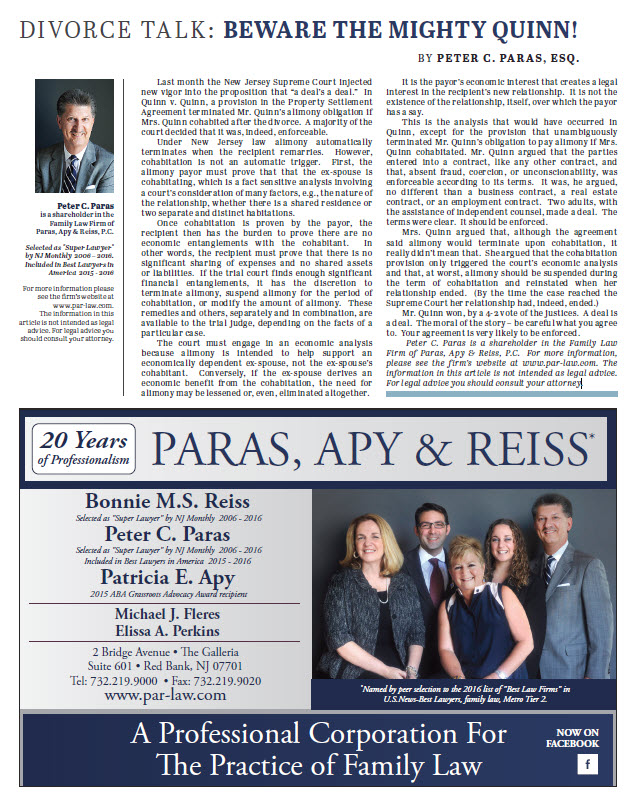Last month the New Jersey Supreme Court injected new vigor into the proposition that “a deal’s a deal.” In Quinn v. Quinn, a provision in the Property Settlement Agreement terminated Mr. Quinn’s alimony obligation if Mrs. Quinn cohabited after the divorce. A majority of the court decided that it was, indeed, enforceable.
Under New Jersey law alimony automatically terminates when the recipient remarries. However, cohabitation is not an automatic trigger. First, the
alimony payor must prove that that the ex-spouse is cohabitating, which is a fact sensitive analysis involving a court’s consideration of many factors, e.g., the nature of the relationship, whether there is a shared residence or two separate and distinct habitations.
Once cohabitation is proven by the payor, the recipient then has the burden to prove there are no economic entanglements with the cohabitant. In other words, the recipient must prove that there is no significant sharing of expenses and no shared assets or liabilities. If the trial court finds enough significant
financial entanglements, it has the discretion to terminate alimony, suspend alimony for the period of cohabitation, or modify the amount of alimony. These
remedies and others, separately and in combination, are available to the trial judge, depending on the facts of a particular case.
The court must engage in an economic analysis because alimony is intended to help support an economically dependent ex-spouse, not the ex-spouse’s
cohabitant. Conversely, if the ex-spouse derives an economic benefit from the cohabitation, the need for alimony may be lessened or, even, eliminated altogether.
It is the payor’s economic interest that creates a legal interest in the recipient’s new relationship. It is not the existence of the relationship, itself, over which the payor has a say.
This is the analysis that would have occurred in Quinn, except for the provision that unambiguously terminated Mr. Quinn’s obligation to pay alimony if Mrs.
Quinn cohabitated. Mr. Quinn argued that the parties entered into a contract, like any other contract, and that, absent fraud, coercion, or unconscionability, was enforceable according to its terms. It was, he argued, no different than a business contract, a real estate contract, or an employment contract. Two adults, with the assistance of independent counsel, made a deal. The terms were clear. It should be enforced.
Mrs. Quinn argued that, although the agreement said alimony would terminate upon cohabitation, it really didn’t mean that. She argued that the cohabitation provision only triggered the court’s economic analysis and that, at worst, alimony should be suspended during the term of cohabitation and reinstated when her relationship ended. (By the time the case reached the Supreme Court her relationship had, indeed, ended.)
Mr. Quinn won, by a 4-2 vote of the justices. A deal is a deal. The moral of the story – be careful what you agree to. Your agreement is very likely to be enforced.
Peter C. Paras is a shareholder in the Family Law Firm of Paras, Apy & Reiss, P.C. For more information, please see the firm’s website at www.par-law.com. The information in this article is not intended as legal advice. For legal advice you should consult your attorney

